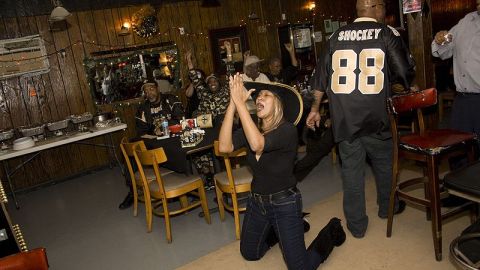Can Sports Save a City?

A big part of the recent Super Bowl becoming the most-viewed telecast in American history was the story of the New Orleans Saints providing the ultimate celebratory rallying cry for a city that was mostly underwater less than five years ago. While there’s no denying the spiritual lift that sports teams provide for American cities in their troubled times, is it possible for that spiritual lift, coupled with a spike in revenue, to actually save a city?
It has been documented by some researchers that a winning team can truly improve the collective psyche of people. One Indiana University study showed that fans of winning teams were better-equipped to solve mental puzzles and deal with romantic rejection. Dr. Leonard Zaichkowsky, a renowned sports psychology expert, has spent years studying the emotional benefits of winning and losing on children and adults. In her deconstruction of the Saints’ championship, Newsweek’s Molly O’Toole mentions Zaichkowsky’s concept of community mood states, in which a winning team actually enhances the health of a city’s residents. With the Saints staying in New Orleans until at least 2025, the city’s fortunes could be changed forever. If nothing else, the Saints’ home, the Superdome, has been transformed from a tragic symbol of Katrina to the home of champions.
While enhancing a city’s collective mood is good, there’s no denying that the ultimate contribution any sports team makes to its city is in the form of revenue. In Ohio, a state that has been hit particularly hard by the recession, long–term financial and spiritual well-being may partially rest not so much on a team, but on an athlete. That man is LeBron James, the Cleveland Cavaliers’ Ohio-born transcendent basketball star who could potentially leave Cleveland this summer as a free agent. James leaving Ohio would stomp on the collective egos of Cleveland basketball fans, but it could also mean the state losing its most-cherished economic asset.
While the Cavaliers have seen unprecedented success on the court since James’ arrival, the team has even drawn prominent Chinese investment, an anomaly not just in Cleveland, but in all of sports. Not only has the value of the team almost doubled since James arrived, but an academic paper from Pace University’s Jared Taylor attributes the team’s 71% increase in taxable revenue to James. But what about the cities that don’t have a LeBron James at their disposal?
The economic shortfall the city of Pittsburgh has experienced for the past decade has been cushioned by the local teams winning a Super Bowl and a Stanley Cup last year. Last year’s Stanley Cup champions, the Penguins, saw their playoff run generate millions in revenue for the local economy, which might be further enhanced by the building of a new arena, which a winning team no doubt helped inspire.
In Detroit, the city perhaps most synonymous with recent economic hardship, sports has been a huge contributor to revenue, just not from the local teams. Over the past decade, the city has hosted the Super Bowl (which brought $273.9 million to the city), baseball’s All Star Game ($42 million), and the Ryder Cup of Golf ($77 million). While these events have been great for the city, the local teams haven’t been as successful as revenue generated from local casinos has decreased. During this difficult time, the city’s hopes could similarly rest on their football team, the woeful Lions. But considering where the city of New Orleans came from, Detroit’s hopes for a Super Bowl can’t be that far-fetched.





